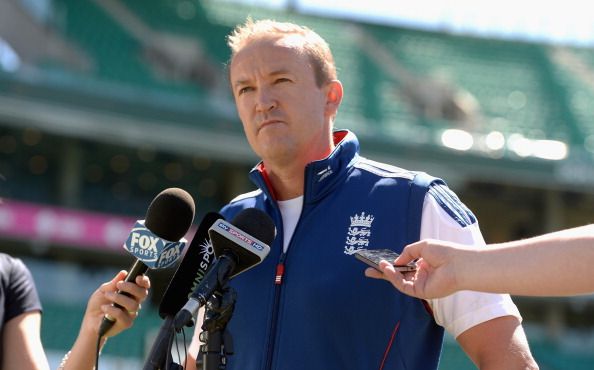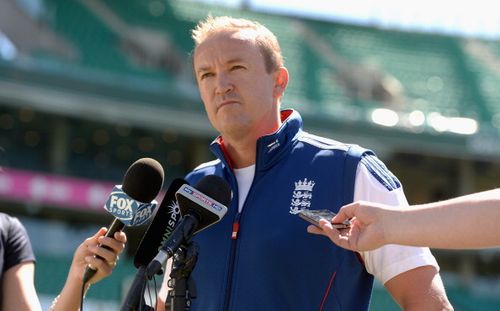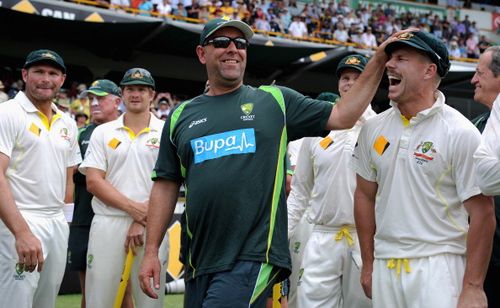
Results don't always matter - A look at the role of a cricket coach

Andy Flower’s departure ends one of the more consistent period of modern English cricket
The news of Andy Flower’s departure from his role as the director of the English cricket team hardly came as a surprise. This, despite the fact that during the whitewash in Australia, top English and Wales Cricket Board (ECB) officials had repeatedly stressed on the need for stability and backed the coach.
There is no doubt that Flower wanted to preside over the rebuilding process, but the 0-5 loss in a series England started as favourites was too damning a result for status quo to be maintained. Something had to give. Someone had to take the responsibility.
Apparently, Flower’s strict disciplinarian act and method driven approach had become too much for the players to bear. The team had stagnated. The tourists had become a weary, scared and joyless bunch merely going through the motions. The atmosphere was far from ideal to allow the players to express themselves.
Strangely, not too long ago, for the same qualities Flower was touted as the best thing that happened to English cricket in a very long time. His tenacity, attention to detail and the no nonsense attitude were given credit for transforming the England into a well oiled machine. His professionalism was termed as a model for aspiring coaches to follow.
His record speaks for itself – three consecutive Ashes victory, a whitewash at home and a rare away series win against India, a victorious twenty20 World Cup campaign in the West Indies and reigns, albeit brief, at the top spot in all three formats of the game. One would be hard pressed to think of a more consistent period for English cricket. It is hard to understand how a man with such an impressive track record suddenly become the root cause of all problems.
While the goodbyes are said to Flower and the ECB plans it next course of action, it is time to revisit the age old question, is the importance of a coach of a cricket team overestimated?
In recent times, there have been numerous occasions where the coach has been held responsible for the team’s poor performance. Apart from Flower, people like Mickey Arthur, Greg Chappell and a long list of coaches of the Pakistan cricket team come to mind. One can’t help but think that at a time when the players are becoming more powerful, the coaches are made easy scapegoat.
It is important to remember that a coach doesn’t score any run or take wickets; he simply prepares the team to do so on the field. A coach might resort to minor adjustments to players’ techniques, but at the highest level it is highly unlikely that he will make any sweeping changes.
He might prepare strategies but, unlike in football, he has very little say in team selection matters and most of the decisions are taken by the captain. His job, primarily, is to prepare a conducive environment in which the maximum can be extracted from the players. His task is more akin to a manager. A facilitator, if you will. When the game commences, there is very that little that he can do other than observing his team and taking notes.
As Flower contemplates his future at a much lower rung in the hierarchy of the ECB setup, there is Darren Lehmann, sitting pretty at the other end of the spectrum. He is a man who can do no wrong. At the moment there are few Australians more popular than the former left-handed batsman.

It’s fun again in the Aussie camp with Darren Lehmann lightening things up a bit
Australia were in shambles when the former Aussie batsman took over. A whitewash in India was followed by a first round exit in the Champions Trophy and some experts didn’t shy away from predicting a whitewash in England as well. The team had to deal with some off field distractions as well.
But since he took over, the transformation from coming within 20-odd runs of losing the series in England by a 4-0 margin to whitewashing the English team at home in three months time has been remarkable.
It’s not that Lehmann’s introduction made the Australians to improve the technical aspect of their game overnight. Shane Watson still is a prime candidate for the lbw dismissal. Chris Rogers is still susceptible against quality spin. Phillip Hughes and David Warner continue to have their issues in negotiating deliveries in the corridor of uncertainty. George Bailey isn’t Test material. The spin department can improve.
Instead, Lehmann instilled a sense of stability and reminded that the game is to be enjoyed. He created an atmosphere of trust and the players were made to feel comfortable within the system. Out went the homework before Test matches and in came the joke of the day contest. Presumably, a generous quantity of beer also became part of the equation.
The cricketers were still accountable for their actions on the field but there was an unmistakable element of fun. It helped the Aussie cricketers to raise their game and they won the Ashes, not Lehmann.
Another good example is John Buchanan. A look at his record might suggest that he enjoyed immense success during his association with the strong Australian cricket team and took them to dizzying heights, but failed miserably when he was at the helm of things of the Kolkata Knight Riders, a team of much lesser pedigree. But on both occasions, the players were solely responsible for the results.
Though it is a common perception that he just happened to be at the right place in the right time and his contribution to Australian cricket has often been questioned, Michael Hussey recently revealed in his book about how he used to challenge the players to take their game up to the next level. While the likes of Ponting, Warne, McGrath and Hussey were able to meet the challenges and realize their full potential, KKR’s ensembled cast simply wasn’t good enough.
So, to use the team’s performance as a parameter to judge a coach is grossly unfair as it ultimately boils down to how good the players are. What should really matter is how compatible a coach and his methods are with the team. For a good reason, he is listed as one of the ‘support’ staff and not in the XI that represent the team on the field.